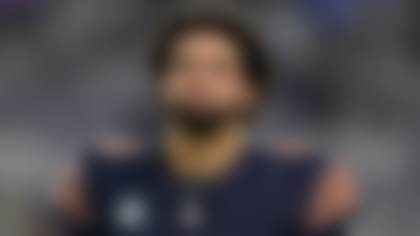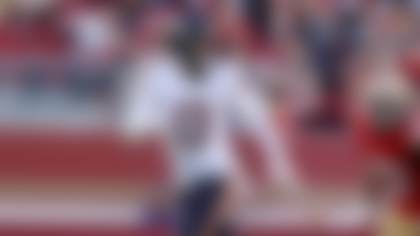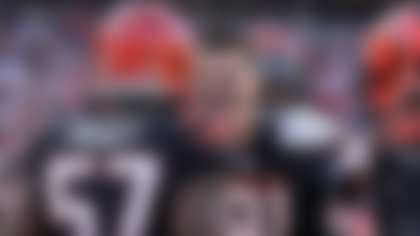When writing the history of pro football in the early 21st century, Andy Dalton is unlikely to get more than a paragraph or two. But that doesn't make the Red Rifle insignificant in the history of the game. Quite the contrary.
First, the résumé: Across 11 seasons in the NFL -- a career that continues to this day -- Dalton has amassed 35,279 passing yards and 226 touchdowns against 135 interceptions. He's been selected to the Pro Bowl three times and guided the Cincinnati Bengals to the playoffs in each of his first five seasons. True story: Back in 2016, Dalton was ranked No. 35 (!) on NFL Network’s Top 100 countdown of the best players in the sport. tells us Dalton's career has been of "similar quality and shape" to guys like Ken O'Brien, Ron Jaworski, Jim Everett and Jay Cutler. Solid company!
And yet, Dalton never found that second gear to put himself in the conversation of the game's best passers. Perhaps it was his good but rarely great statistical output. More problematic were his team's January struggles: The Bengals never won a playoff game with Dalton at the controls.
Cincinnati's annual postseason defeat in the early 2010s, almost always in the earliest Wild Card window on Saturday afternoon, became a source of paradoxical celebration for my friend and colleague, Chris Wesseling, who organized well-attended tavern gatherings -- dubbed Wesstivus -- to marinate in the misery of another fruitless playoff cameo by his hometown team. Wess was a native of West Cincinnati, and his frustration with Bengals leadership was legendary to all who knew him. Years earlier, he'd crafted a 200-page dossier of newspaper clippings and printouts that documented decades of organizational malfeasance. It effectively served as divorce papers between a man and his boyhood team.
Despite (or perhaps because of) his complicated past with the Bengals, Dalton became a figure of considerable interest to Chris. He called Dalton the "prime meridian" of NFL QBs and posited that other teams could use Dalton and his unique brand of plus-mediocrity to diagnose the health of their own quarterback situation.
To Wess, Dalton's successes and failures were entirely the product of the talent and coaching of his team. Dalton did not possess the ability to make a team better or worse -- rather, his success or failure was predicated entirely on what was built around him. Andy Dalton wouldn't make you worse ... but he couldn't make you better, either.
These ideas became the basis of what Wess called The Dalton Scale. Here's how Chris explained it on a 2019 episode of the Around The NFL podcast:
"Andy Dalton represents quarterback purgatory. If you are ranked below Andy Dalton, your franchise needs a quarterback. If you're ranked above Andy Dalton, you're in ship-shape, everything's figured out, you're good to go."
Dalton lost his grip on his starting job in Cincinnati when Joe Burrow was selected first overall in the 2020 NFL Draft. Dalton was released a week later and has bounced around the league in the years since, spending 2020 with the Cowboys and 2021 with the Bears. He will open the 2022 season behind Jameis Winston in New Orleans. As Dalton, now 34, transitions into the twilight years of his career, it begs the question: If Andy Dalton is no longer an accurate representation of the prime meridian of NFL QBs -- then who is?
Let's try to figure that out. I dedicate this quest in memory of Chris Wesseling, whom we lost to cancer in 2021. Chris was an incredibly keen football mind, and The Dalton Scale is an example of the unique and fun insight that made him such a force. Miss you, friend.
***
Before we deduce which quarterbacks profile similarly to Dalton, let's rule out players who are not relevant to this conversation. The following QB1s are clearly above the Dalton line -- i.e., they're proven franchise rocks that teams are lucky to call their own:
- Josh Allen, Buffalo Bills
- Tom Brady, Tampa Bay Buccaneers
- Joe Burrow, Cincinnati Bengals
- Derek Carr, Las Vegas Raiders
- Justin Herbert, Los Angeles Chargers
- Lamar Jackson, Baltimore Ravens
- Patrick Mahomes, Kansas City Chiefs
- Kyler Murray, Arizona Cardinals
- Dak Prescott, Dallas Cowboys
- Aaron Rodgers, Green Bay Packers
- Matthew Stafford, Los Angeles Rams
- Russell Wilson, Denver Broncos
Now let's eliminate potential starters who -- at this juncture in their careers, anyway -- clearly fall below the Dalton line -- i.e., unproven passers who profile as stopgap or replaceable entities:
- Jacoby Brissett, Cleveland Browns
- Sam Darnold, Carolina Panthers
- Jared Goff, Detroit Lions
- Daniel Jones, New York Giants
- Drew Lock, Seattle Seahawks
- Marcus Mariota, Atlanta Falcons
- Baker Mayfield, Cleveland Browns
- Geno Smith, Seattle Seahawks
- Carson Wentz, Washington Commanders
Finally, let's remove all potential starting quarterbacks who are in their first or second seasons. There's simply not enough data to accurately judge where these guys fall yet:
- Justin Fields, Chicago Bears
- Mac Jones, New England Patriots
- Trey Lance, San Francisco 49ers
- Trevor Lawrence, Jacksonville Jaguars
- Davis Mills, Houston Texans
- Kenny Pickett, Pittsburgh Steelers
- Zach Wilson, New York Jets
I left Browns QB Deshaun Watson out of the conversation because he could face discipline from the NFL, which is investigating whether he violated the league's personal conduct policy stemming from allegations of sexual misconduct.
So, where does that leave us? I present to you, in alphabetical order, the nominees for the new face of ... The Dalton Scale.

In some ways, Cousins might appear to be the ideal successor to Dalton. He’s been a durable starter with strong statistical output, has enjoyed very little playoff success and has produced an almost comical level of mediocrity in terms of team success. Cousins was 8-8 as a starter last season (he missed one game due to COVID-19) and will enter his 11th pro season with a 59-59-2 career mark as a starter. You like that? No, not really. It also feels pertinent that his former coach, Mike Zimmer, perpetually gave off the vibe he’d pay a million dollars for the right to throw Cousins into a river without legal consequence. All that said, in his four seasons with the Vikings, Cousins has thrown 124 touchdowns against just 36 interceptions with a passer rating of 103.5. The man’s been hiding in plain sight as the best secret in fantasy football for a half-decade running. Cousins can be maddening, but I believe he makes the Vikings better than an average, Dalton-line-worthy passer.

Garoppolo was a away from beating Patrick Mahomes in the Super Bowl two years ago, then watched a second trip to the big game slip away when the Niners couldn’t close out the Rams in January’s NFC Championship Game. Even with those high-profile misses, a 4-2 career playoff record and .702 career winning percentage as a starter indicates Jimmy G. has no place in the conversation of the Dalton Scale. Then again, it was apparent last season that San Francisco advanced in the postseason despite the quarterback, and the team’s decision to select Trey Lance with the third overall pick in the 2021 NFL Draft -- paired with the subsequent and ongoing attempts to move Garoppolo in a trade -- says everything about how Kyle Shanahan and John Lynch feel.

Hurts is a very difficult evaluation, as the Eagles can surely attest. He’s entering his third season, but he’s only made 19 career starts. When his body is right, he presents a major headache for defenses with his ability to make plays, both from the pocket and via his explosive scrambling ability. His struggles against the Bucs in last season’s playoffs factor in here, but again, this a green QB with considerable upside. We’ll learn a lot more about Hurts this season, as he takes the field with another year of experience and an improved supporting cast that includes star wideout A.J. Brown. In terms of The Dalton Scale, this evaluation is incomplete.

At first glance, Ryan stands out like a sore thumb in this exercise. This is a borderline Hall of Fame candidate who owns every Falcons passing record and won the NFL MVP award in 2016 (he should have won a Super Bowl that season, too). So what’s he doing here? Ryan’s inclusion comes down to the quarterback he is now ... not five years ago. At 37 years old, Ryan has lost zip on his passes, and he's entered the late-period Dan Marino stage of pass-rush escapability. When he faced a defense with dogs in the front seven in his final season in Atlanta, it was the recipe for a long day at the office. On the flip side, a well-protected Ryan can still cook up an opposing defense. As the new starter in Indianapolis, he’ll play with a vastly superior offensive line and the reigning rushing champion in Jonathan Taylor. Can this version of Ryan make that offense better?

Like Hurts, Tua is a difficult projection as he enters his third season. His first year was complicated by recovery from hip surgery coupled with a generous helping of FitzMagic, while Year 2 in Miami served as an up-and-down affair that included both a seven-game losing skid and a seven-game winning streak for a weird Dolphins team. Miami went all out in the offseason to improve the supporting cast, adding Pro Bowl left tackle Terron Armstead in free agency and unicorn wideout Tyreek Hill in a blockbuster trade with the Chiefs. Given these upgrades alone, the pressure is on Tagovailoa to take a substantial leap and prove he is a top-12 quarterback. If he can’t, chances are high Miami is in the market for a new passer in 2023.

Truth time: Tannehill isn’t in this conversation for me if not for the events of Jan. 22, 2022, when the top-seeded Titans were bounced out of the Divisional Round thanks largely to a three-INT meltdown by their quarterback. Tannehill’s run in Nashville has been overwhelmingly positive on balance, but suspicion lingers among many Titans fans that the Tannehill experience comes with a built-in ceiling. That he’s a proficient quarterback who can take you to the big dance but doesn’t have the right moves to bring the trophy home. This draws a direct throughline to Dalton, whose regular-season success also stood in stark contrast to individual and team results come January. With Tannehill entering his age-34 season, it’s fair to wonder if he exists in the murky area between good and great. That purgatory is extremely relevant to this particular conversation.

Winston remains one of the great riddles in the NFL. The former first overall pick is the only quarterback on this list to throw for more than 5,000 yards in a season ... but in that same year, he also established the league’s 30/30 club, by throwing 30 touchdowns and 30 interceptions. He got a fresh start with the Saints after Drew Brees stepped aside last season, but a knee injury on Halloween ended what had been a promising start to his year. There’s been talk that Winston is now a smarter quarterback who has learned to play within himself, but I suppose I need to actually see that in action over the course of 17 games. Removing Sean Payton from the picture doesn’t feel like a positive development, either. Bottom line: Winston has work to do to prove he is simply at the Dalton line, let alone above it.
FINAL VERDICT
In a conversation on this subject last week on the Around The NFL podcast, I nominated Matt Ryan for The Dalton Scale replacement. It felt to me like the current version of Ryan profiled as an accurate dividing line between franchise QBs and everyone else. But, given more time to mull the topic thanks to this little exercise, my feelings have shifted.
It's now Tannehill who feels to me like the most appropriate choice. (The Titans might not disagree, considering their decision to draft Malik Willis in the third round of the 2022 NFL Draft.) We let our podcast listeners have a say, as well, and more than 5,000 voters came back with a pecking order that Mike Zimmer would love:
- Kirk Cousins: 50.7%
- Ryan Tannehill: 28.5%
- Jameis Winston: 11.3%
- Matt Ryan: 9.5%
The real truth might be that Andy Dalton -- and how he produced during his prime years in Cincinnati -- made him a unique case. He represented the murky middle ground at a particular moment in football history, which cannot be replicated simply by plugging another passer into his place. This means that Andy Dalton, in this incredible niche scenario, will forever be an immortal. Which also must mean that, yep, Wess nailed it.
He was cool like that.
Follow on Twitter.












